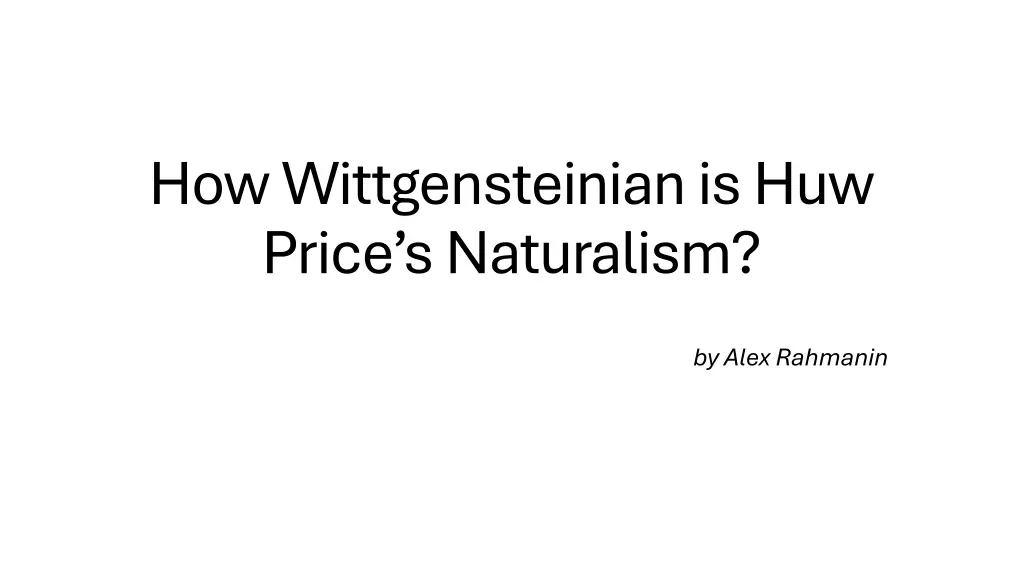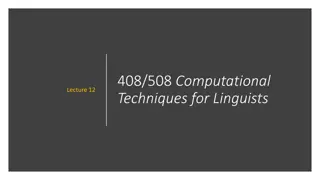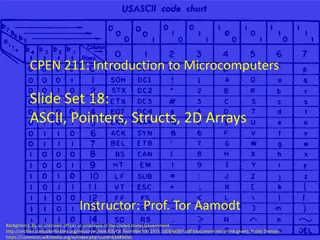
Understanding Huw Price's Naturalism in Context
Delve into how Huw Price's reinterpretation of naturalism aligns with Wittgensteinian philosophy, examining the critiques, influences, and the philosophical spirit bridging the two perspectives. Explore the definitions of scientific and philosophical naturalism and their interplay in Price's work.
Download Presentation

Please find below an Image/Link to download the presentation.
The content on the website is provided AS IS for your information and personal use only. It may not be sold, licensed, or shared on other websites without obtaining consent from the author. If you encounter any issues during the download, it is possible that the publisher has removed the file from their server.
You are allowed to download the files provided on this website for personal or commercial use, subject to the condition that they are used lawfully. All files are the property of their respective owners.
The content on the website is provided AS IS for your information and personal use only. It may not be sold, licensed, or shared on other websites without obtaining consent from the author.
E N D
Presentation Transcript
How Wittgensteinian is Huw Price s Naturalism? by Alex Rahmanin
Contextual Remarks Huw Price claims that his project of reinterpreting naturalism is Wittgenstein s (Wittgensteinian) in spirit. Here are main problems with this claim: Some Wittgenstein scholars and Wittgensteinian philosophers may strongly disagree with presenting Wittgenstein s philosophy as naturalism and/or interpreting him along the lines of neopragmatism, of which Huw Price is a leading figure. Wittgenstein s philosophy is just one of many on which Price bases his project. What is Wittgenstein s influence in addition to that of Ramsey, Carnap, Quine, Ryle, Rorty, Brandom, Blackburn, and ultimately Hume? Price relies on fourmetaphors from Wittgenstein. Do they have the weight he attributes to them, and are they sufficient to evoke Wittgenstein s spirit ?
Plan 1. Price s naturalism Placement problems and subject naturalism The critique of representationalism and metaphysics Semantic deflationism and linguistic pluralism 2. Philosophical spirit of Price and Wittgenstein 3. The pros and cons of interpreting Price s naturalism in a Wittgensteinian spirit
Naturalisms Def 1 Scientific naturalism is a metaphysical doctrine, a view about what there is, or what we ought to believe that there is. It maintains that natural science should be our guide in matters metaphysical: the ontology we should accept is the ontology that turns out to be required by science. Def 2 Philosophical naturalism: most fundamentally, presumably, it is the view that natural science properly constrains philosophy, in the following sense. The concerns of the two disciplines are not simply disjointed, and science takes the lead where the two overlap. At the very least, then, to be a philosophical naturalist is to believe that philosophy is not simply a different enterprise from science, and that philosophy should defer to science, where the concerns of the two disciplines coincide.
Naturalisms Def 1 Scientific naturalism is a metaphysical doctrine, a view about what there is, or what we ought to believe that there is. It maintains that natural science should be our guide in matters metaphysical: the ontology we should accept is the ontology that turns out to be required by science. Def 2 Philosophical naturalism: most fundamentally, presumably, it is the view that natural science properly constrains philosophy, in the following sense. The concerns of the two disciplines are not simply disjointed, and science takes the lead where the two overlap. At the very least, then, to be a philosophical naturalist is to believe that philosophy is not simply a different enterprise from science, and that philosophy should defer to science, where the concerns of the two disciplines coincide. Wittgenstein(ian): Def 2 -> Def 1 Price: Def 2 > Def 1
1.1. Placement problems Price s fundamental objection to traditional naturalism is the existence of facts that do not align with scientific ontology facts that do not align with scientific ontology. Traditionally, these include numbers, meaning, normativity, values, mind etc. Placement problems 1. are hard cases for metaphysics 2. cannot be solved by traditional naturalism 3. originate as problems about human linguistic usage.
1.1. Understanding science Science is fundamentally one-sided in traditional naturalism. If naturalism produces placement problems that it cannot solve, it s because naturalism doesn t pay attention to language, being all about the world. The most interesting questions science could ask are about the kinds of creatures we are, and about the relevance of these characteristics, in our relation to our natural environment. Thus, traditional naturalism misrepresents science traditional naturalism misrepresents science.
1.1. Subject naturalism Rather than of confining science to the world, that is being object philosophy must advance subject subject naturalism, that is begin us about ourselves us about ourselves . object naturalism, begin with what science tells with what science tells Subject naturalism: 1. begins with language 2. tackles placement problems 3. responds to the actual linguistic pluralism 4. purifies science of bad philosophy 5. enriches philosophy with good science
1.1. Metaphysics vs anthropology and linguistics Price delineates two radically different conceptions of the task of scientifically grounded philosophy. On one side lies metaphysics; on the one other, scientific anthropology and the study of certain aspects of human linguistic behavior and psychology . He admits that his project may be too naturalistic for some contemporary Wittgensteinians, but would Wittgenstein himself have objected to it? (He might have thought that it is science, not philosophy, but matter. matter.) but that s a different that s a different
1.2. The critique of representationalism and metaphysics Object naturalism stems from representationalism: language is referential mechanism, and inquiry is a game of matching words to the world. Representationalism is a proto-theory : 1. it dominates philosophy 2. it is tied up with scientism 3. it is inaccessible to object naturalism 4. it is the source of metaphysics, that is ontology theorized by semantic means. Serious metaphysics, Price notes, seems close to the point that Wittgenstein reaches at the end of the Tractatus, when he offers us a view of the relation between language and the world that can t be talked about a view inaccessible by its own lights.
1.2. The critique of representationalism and metaphysics cont d BUT: representationalism and its theoretical reliance on semantic notions must be liable to subject naturalism. Anthropology versus metaphysics Anthropology versus metaphysics: subject naturalism, which is based on what science says about us as natural creatures, looks at actual language variety. Within this view, semantic notions are not compulsory. Wittgenstein in 1930: I might say: if the place I want to reach could only be climbed up to by a ladder, I would give up trying to get there. For the place to which I really have to go is one that I must actually be at already. Anything that can be reached with a ladder does not interest me (CV 10).
1.3. Deflationism Within anthropological outlook of philosophy, we do need a ladder: we stay on the firm ground. Subject naturalism thus reorients philosophy towards science by paying attention to the actual variety of language, and mutatis mutandis reshapes science. Two key notions in this reinterpretation are deflationism and linguistic pluralism. Deflationism Deflationism was employed for a long time by naturalists who failed to understand why it worked: it is a way of ignoring semantic notions; hence, it belongs to subject naturalism, and thus it is a broadly scientific hypothesis about what linguistic creatures like us do with terms such as true and refers .
1.3. Linguistic Pluralism According to the subject-naturalism interpretation, deflationism paves the way for a pragmatist conception of language. Pragmatist conception of language is based on the idea that language is primarily something we do, and therefore, we can frame the semantic or conceptual in terms of actions rather than actions in semantic terms. This position, according to Price, agrees with linguistic pluralism the scientifically established fact of the variety of language in the lives of natural creatures.
1.3. Two metaphors from Wittgenstein It is like looking into the cabin of a locomotive. There are handles there, all looking more or less alike. (This stands to reason, since they are all supposed to be handled.) But one is the handle of a crank, which can be moved continuously (it regulates the opening of a valve); another is the handle of a switch, which has only two operative positions: it is either off or on; a third is the handle of a brakelever, the harder one pulls on it, the harder the braking; a fourth, the handle of a pump: it has an effect only so long as it is moved to and fro (PI 12). Think of the tools in a toolbox: there is a hammer, pliers, a saw, a screwdriver, a rule, a glue-pot, glue, nails and screws. The functions of words are as diverse as the functions of these objects. (And in both cases there are similarities.) (PI 11)
1.3. Global expressivism These metaphors illustrate an approach to language that is radically different from representationalism. If expressions are what speakers do, the old 'bifurcation thesis', which states that language has a truth-apt assertoric core and that non- assertoric expressions deviate from this, is unnecessary. In this case, expressivism must become global: no domain is privileged; all domains are language games. Brandom: By contrast to Wittgenstein, the inferential identification of the conceptual claims that language has a center ... Inferential practices of producing and consuming reasons are downtown in the region of linguistic practice. Price: the assertoric game may indeed be central if we keep in mind that it is a fundamental language game yet with multiple functionally distinct applications .
2. What is worrying about Prices interpretation of Wittgenstein? The downtown metaphor: Why are assertions called a 'fundamental language game' with multiple applications? What makes a language game fundamental? How does a language game differ from its application? Saying these things is too analogous to saying that the meaning of a word has different applications.
2. Theories One explanation for Price's position may be as follows: we have to distinguish between a game and its applications, if we want to give a theoretical weight to the idea that language is activity. In this case, we have to look at various games as different in their functionality while being activity. All the worries thus come down to craving to theorizing theorizing in Price. ZB: the preference for the handle Wittgenstein s lights, especially when we are doing philosophy! (PI 11)? handle metaphor over the toolbox toolbox metaphor. Can it be justified by For Wittgenstein, observing language serves to clarify philosophical confusion. For Price, observing language allows to build theory to enhance understanding of science.
2. The language game is the primary thing but in two radically different ways. According to Price, representationalism is a proto-theory and not real theory because being metaphysically imposed on us it cannot have the empiricist outcome: it is a mythology. Global expressivism, on the other hand, is responsive to the actual language plurality, which makes this approach scientific: global expressivism befits the contingent variety of data. But linguistic pluralism is fundamentally different in Wittgenstein: philosophy starts and ends with language variety. The language games philosophy observes must release the tension we cast upon ourselves when treating one of them as fundamental (say, following representationalist assumptions). Such philosophy doesn t take the variety of language as empirical data, in the way science (whether in Price s or an orthodox interpretation) would take it. Despite being contingent the variety of games with, say, I know, is not a row empirical material to build a theory upon.
3. Two parallel projects? Two ways of thinking about the differences between Price and Wittgenstein: They are merely terminological (~Price). The gulf between them is impassable. My claim is that the perspective from which they are merely terminological is important because the overlap between the two projects, despite the insurmountable differences, is too substantial to ignore the logic behind them logic behind them.
3. Two parallel projects? contd 1. The status of deflationism as a hypothesis / theory : 1. The status of deflationism as a hypothesis / theory : It is sensitive to the contingent variety in language (and may provide tools to explain it within various theoretical frameworks); it is a better alternative to representationalism because deflationism includes representationalism but not vice versa. It is probably a special kind of theory: it effectively (according to Price) removes the obstacles to viewing language as a splendid variety and thus provides a good foundation to make a philosophical argument against representationalism.
3. Two parallel projects? contd 2. Price discusses 2. Price discusses philosophical philosophical naturalism: naturalism: without alternatives in view, the possibility that representationalism is deeply incoherent looks disastrous, a kind of skepticismthat philosophy cannot afford seriously to entertain (my emphasis). If Price s program at least partially responds to this specific philosophical worry, the theoretical weight of expressivism may be reduced. placement problems disappear if we switch to global expressivism AND cannot be ignored. They are real problems because they make visible the representationalist assumptions and the fact that placement problems cannot be solved within object naturalism.
3. Two parallel projects? contd 3. Metaphysics is a misunderstanding of both philosophy and language. 3. Metaphysics is a misunderstanding of both philosophy and language. Wittgenstein: metaphysics = philosophy infected with science. Price: metaphysics = philosophy infected with bad science. Metaphysics is a misleading philosophy informed by a wrong picture of science we obtain due to philosophically misleading assumptions about language. Proper science (in light of subject-naturalism) enhances understanding of language in its contingent variety, a task that, for Wittgenstein, was achieved through observation of ordinary language.
3. Two parallel projects? contd 4. Price s philosophical naturalism changes the way science is 4. Price s philosophical naturalism changes the way science is viewed. viewed. The philosophical image of science, centered on anthropology and linguistics, is incompatible with the physicalist outlook. The general flaw of object naturalism, according to Price, is that we are employing scientific vocabulary, to theorize about the function and genealogy of vocabularies in general. this would be overcome by a scientific discovery that science is just one thing among many that we do with the linguistic tools of assertion and ontological commitment. philosophy may primarily serve as a self-help therapy, whose role is to help us to overcome our own philosophical cravings the craving for metaphysics, for example.





